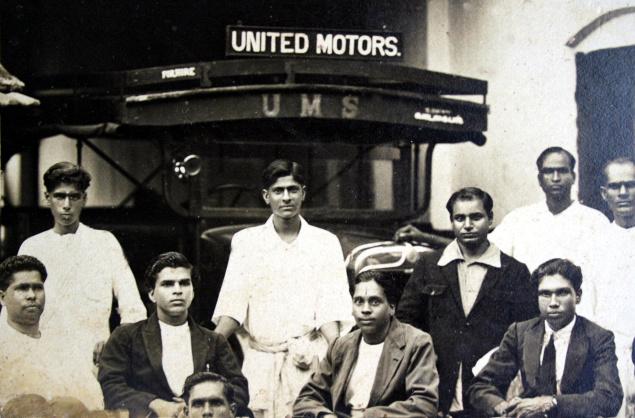R. Raju Naidu (seated, second from right) at the UMS office, with the bus in the background Photo: Special Arrangement
I grew up in a city that still resembled a village. There was not much traffic. As kids, we would dart across the road to go our friends’ homes. Our houses still had wells from which we would draw salt water. For the kalkandu-like Siruvani water, we would run up to a friend’s home and take all we needed.
There were very few schools — St. Michaels’, Union High School (where I studied), City Municipal High School, Sarvajana School and Stanes, which we called Durai school.
In the early years of my life, we lived on the narrow Raja Street. During lunch break, we would dash home from school to gobble whatever amma had prepared for lunch — mostly thayir saadham — and run back as we had to squeeze in at least 10 minutes for football and basketball.
Later, we moved to Tatabad. Those in the defence forces occupied the Tatabad and Sivananda Colony stretches. Later, the land was sold to Tata Oil Company. That’s when my father, R. Raju Naidu, an entrepreneur, bought two plots of 17 cents each for 800 rupees.
You could count the number of homes from Gandhipuram to Vadakovai — seven in all. There was no power and we depended on the moonlight and lanterns to reach home. There were cotton fields all around us. Years later, we all paid Rs. 51 each as deposit for electrification.
Appa joined hands with Kalangal Gopalswami Doraiswami Naidu (GD Naidu) to start United Motor Services. He moved to Madras for a six-month training at Union Motors. They started plying a bus between Udumalpet and Coimbatore and later to Palladam, Dharapuram, Gobichettipalayam, Erode and Pollachi.
Soon, my father started manufacturing furniture. He got teak and rosewood logs from Nemmara under the guidance of Sri Viswanathan Chettiar. My father, a staunch Gandhian, spun yarn on his rattai for an hour every day.
Once we grew up, it was cinema for our entertainment. Coimbatore had seven theatres, but we frequented Srinivasa and Rainbow. I have, at times, watched 30 films a month.
My dependable black Hercules cycle was my companion. I would ride it everywhere. The Brooke Bond Road was called Panankaatu Road. It was desolate. Even while travelling as a group, it would give us the shivers. Hundred ft road did not exist then. The Sanganur pallam was close by home and we would race across its sands.
Once in intermediate and college, at PSG Arts College and PSG College of Technology, respectively, we would cycle to Peelamedu from Tatabad. The onward trip used to be a pleasant half an hour. The return journey took us double the time. Howling winds threatened to throw us off our cycles and the steep gradient from present-day Nava India made pedalling impossible. We would walk with our cycles till Gandhipuram before pedalling again.
At college, Dr. GRD and Prof Venkataraman were great influences, encouraging us to be creative. As we could not go home for lunch, we depended on the PSG Institution canteen near the electrical lab where lunch — rice, sambar and mor — was served for 36 paisa. But, it was near impossible to find a seat. Often, the Kannanaicker kadai that sold dosai, Iyer tiffin kadai and the biryani kadai provided sustenance.
Those days, industry flourished in the city. There were 450 foundries inside town. Coimbatore was suffused with the spirit of entrepreneurship. You wanted to be different and make something useful. Using the crown and pinion from an Ambassador car, I created a wet grinder. The only disadvantage? If my wife switched it on, our neighbours across the road could hear its roar!
Industrial estate
Ganapathy was where the first industrial estate in the city — Textool Feeder Industrial Estate — came up, courtesy D. Balasundaram of Textool. He wanted to increase the production of textile parts. My father was allotted a site and manufactured gears. During World War II, there was severe petrol shortage and my Appa consulted DB and manufactured a producer gas plant with firewood and charcoal. He used the fuel to run buses. He also built a gas plant for cars.
Our city has changed so much. But, I have fond memories of it. How we’ve let down this wonderful city. There are no checks on pollution. Rains have become a nightmare. Driving in Coimbatore used to be a pleasure. Not anymore. We sorely lack road etiquette.
Bio:
R. SANTHANAM: Born in 1934, he did his engineering from PSG College of Technology. He taught for a while before turning manufacturer of gears. He used to be a rallyist for some years with G.R. Karthikeyan (Narain’s father) and is a member of the Coimbatore Rifle Club. He was appointed Range Officer, Shooting Range, for the 1982 Asiad
I REMEMBER
When it rained, we would go to school by train. The steam engine would be fed fresh coal at Urumandampalayam and smoke would rise into the air. That was our signal.
We would scamper to the Vadakovai station from home and travel to Coimbatore paying six annas.
source: http://www.TheHindu.com / Life & Style> Society / by Subhaj Rao / February 14th, 2012
